Key Insights
- Algorand’s market cap outpaced the broader crypto market cap, growing by 123% compared to 53% QoQ.
- Algorand added 1.9 million new addresses in Q4 2023, a 72% increase QoQ.
- Algorand saw transactions rise by 58% QoQ, largely driven by the 43% increase in native ALGO transactions.
- Continuing the xGov grant program in Q4, xGov participants approved 18 grant applications for a total funding of 1.5 million ALGO ($332,000).
- Algorand’s DeFi TVL grew by 109% QoQ, recovering from the shutdown of Algofi the previous quarter and reaching its second-highest level from the past year.
Primer
Algorand (ALGO) is a smart contract platform employing a variant of the Proof-of-Stake (PoS) consensus mechanism, termed Pure Proof-of-Stake (PPoS). The protocol was founded by Turing award-winning computer scientist Silvio Micali, also known for co-inventing Zero-Knowledge proofs, Verifiable Random Functions (VRF), and probabilistic encryption.
Unlike other PoS smart contract protocols, Algorand currently does not reward nodes that participate in consensus, nor does it include a staking lockup or slashing mechanism. However, Algorand plans to incentivize consensus in the future. Similar to relying on stake weight in consensus, Algorand PPoS randomly selects consensus nodes based on their ALGO balances using a Verifiable Random Function (VRF), where having a larger balance increases the holder’s chance of selection.
Algorand incorporates a system of peer-to-peer relay nodes and non-relay nodes, which can be configured as archival nodes or to participate in consensus. Algorand’s PPoS consensus protocol ensures that only one block per consensus round can be included in the chain. This process makes Algorand essentially unforkable, where the probability of forking the Algorand blockchain is roughly 10-18.
Algorand’s smart contract execution layer is powered by the Algorand Virtual Machine (AVM). The AVM supports applications developed in TEAL, an assembly-level programming language. With the developer preview now live, Algorand supports native Python smart contract development.
Algorand Technologies, the founding entity, is behind most of the network’s development. The Algorand Foundation is a not-for-profit organization focused on ecosystem initiatives like governance, funding Algorand-based projects, building developer tooling, and encouraging grassroots development. The Algorand ecosystem features a growing set of projects across many sectors, including DeFi, RWAs, payments, and gaming.
Website / X (Twitter) / Discord
Key Metrics
Performance Analysis
Market Cap & Revenue
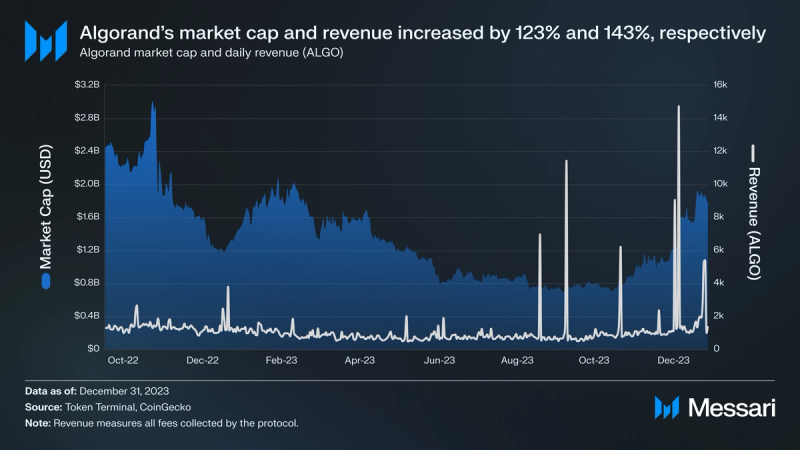
Building off the momentum of the general crypto market cap growing by 53% in Q4, Algorand’s market cap grew by 123%. With transactions increasing by 58% QoQ, fee revenue was up 60%, to its highest level in a year in ALGO terms, and revenue measured in USD grew by 143%. The outperformance of Algorand against the market may be a result of the constant development throughout the ecosystem. Multiple novel applications launched on Algorand in Q4 encompassing subjects such as a regulated and programmable euro, tokenized farmland, and a developer marketplace for selling code snippets.
Addresses & Transactions
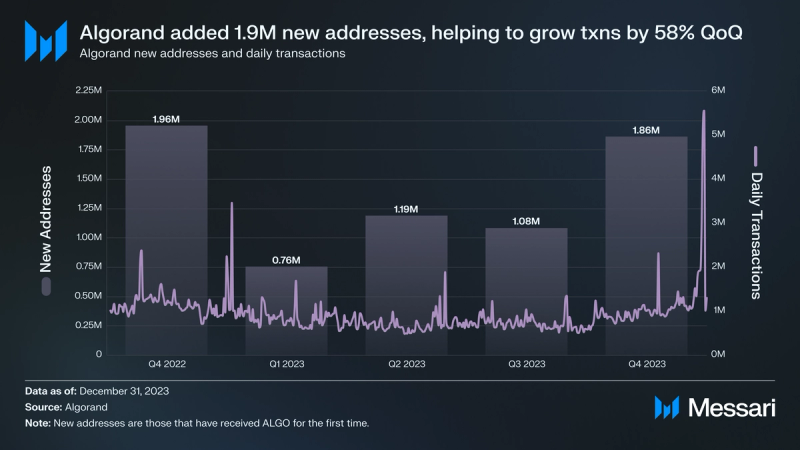
In Q4, Algorand added 1.9 million new addresses, up 72% QoQ. It also saw transactions grow by 58% QoQ. Toward the end of the quarter, transactions spiked over 5.5 million, the highest number over the past year. Aiding the spike in total transactions, ALGO transactions increased by 43% QoQ. The growth may be a result of sticky applications like Lofty.ai, which consistently sees over 7,000 monthly active users, and TravelX, which passed a milestone of issuing over 2 million NFT plane tickets (over 1 million issued in Q4 alone).
Staked ALGO
Staking ALGO for governance is different from most other chains. First, users must “commit” a certain amount to governance. If their ALGO balance falls below their commitment, then their entire stake is considered unstaked or uncommitted. Instead of directly participating in governance through the Algorand Foundation’s interface, users can also participate via Folks Finance’s Liquid Governance program, Algorand’s largest DeFi protocol as of the past two quarters. Its Liquid Governance program enables users to participate in governance by staking (not committing) ALGO in exchange for gALGO, a liquid governance token.
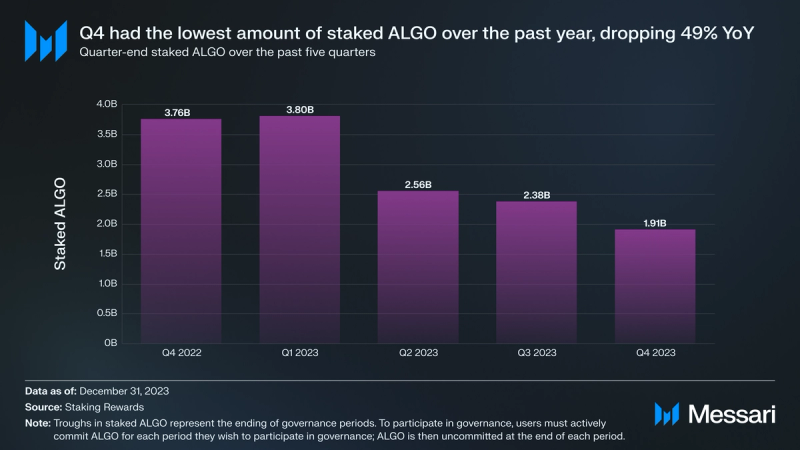
Q4 had the lowest amount of staked ALGO of any quarter over the past year, dropping 49% YoY. This is likely a result of the decreasing amount of rewards per governance period. For context, 70.5 million ALGO was awarded to governance participants in Q4 2022. In Q4 2023, only 32 million ALGO was awarded. Since Q4’22, ALGO rewards have been decreasing by roughly 9.6 million ALGO per governance period. The declining metric may be pointing to users preferring to use the native asset as opposed to committing it to governance — as evidenced by the 58% QoQ increase in transcations.
Stablecoins
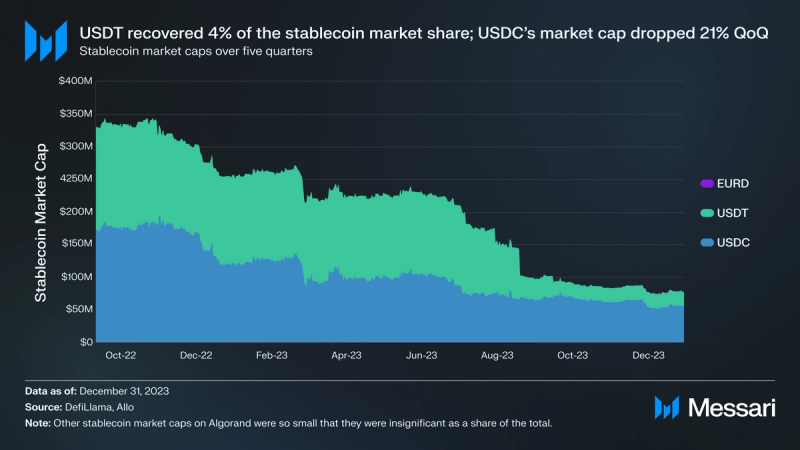
Algorand’s stablecoin market cap has continued to decline throughout the past year with essentially no recovery. It fell by 43% QoQ and 74% YoY. Though both USDT and USDC have declined since last year, USDT experienced a more severe fall on Algorand, with over $100 million being withdrawn in Q3. These outflows did not go into USDC; they left the ecosystem. In Q4, Quantoz launched EURD on Algorand and issued over 1 million euro-backed tokens, equivalent to $1.1 million. EURD accounts for 1.4% of the stablecoin market cap on Algorand.
DeFi
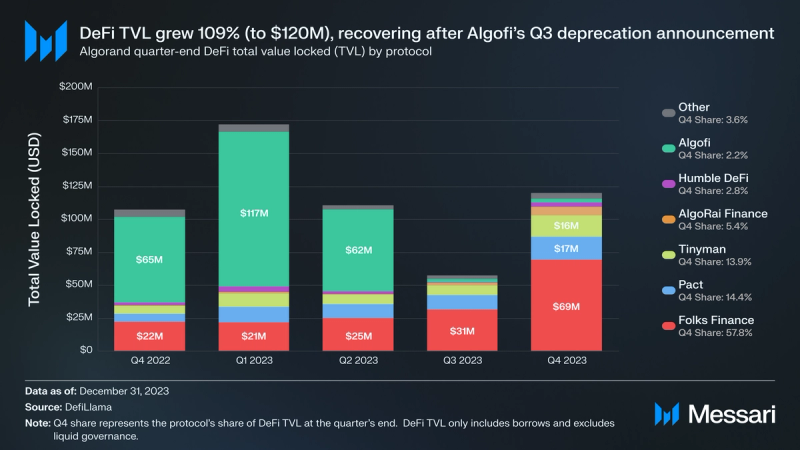
Algorand’s DeFi TVL grew by 109% despite previously falling for two straight quarters. Since the start of Algofi’s shutdown in Q3’23, Algorand DeFi recovered to its second-highest level from the past year, increasing 12% YoY. Meanwhile, Folks Finance grew its market share from 55% to 58%, more than doubling its USD value. Pact and Tinyman also grew in USD value, each accounting for roughly 14% of the DeFi TVL market share in Q4’23.
Qualitative Analysis
Governance
The Algorand Foundation hosts two governance programs, Algorand Community Governance and xGov. The Community Governance program occurs on a quarterly basis and encompasses developments in the Algorand ecosystem. Governance voters that opt-in to xGov can do so during any quarter for a 12-month term with at least four voting periods. xGov voting encompasses the allocation of funding to grant applicants. Staking ALGO for xGov is not risk-free like Community Governance. xGov participants who do not vote will forfeit their staked amount, with the total amount forfeited being rewarded to participants who completed their xGov term.
- Although Governance Period 8 (GP8) occurred in Q3, proposed measures had implications in Q4. During GP8, four measures were proposed. The outcomes of each measure are listed below.
- ALGO from governance rewards will be allocated to the xGov Community Grants program after the initial 2 million ALGO allocation has been exhausted.
- Up to 2 million ALGO per quarter will be allocated to the xGov Community Grants program
- The NFT Rewards program will run again in Q4 with a modification that allows marketplaces to keep the revenue generated as fees through the rewards program.
- 500,000 ALGO will be allocated to the NFT Rewards program in Q4.
- Governance Period 9 (GP9) occurred in Q4. During GP9, four measures were proposed. The outcomes of each measure are listed below.
- 15 million ALGO will be allocated to funding DeFi and the Targeted DeFi Rewards program.
- 7.5 million ALGO (of the 15 million allocated to funding DeFi) will be allocated to the Targeted DeFi Rewards program in Q1 2024.
- The NFT Rewards program will run again in Q1 2024 with no modifications.
- 650,000 ALGO will be allocated to the NFT Rewards program in Q1 2024.
- xGov Period 2 occurred in November and December and saw 77% participation from unique accounts. Of the 23 grant applications, 18 were approved for 1.5 million ALGO in total. Projects funded encompass the following:
- Analytics: A dashboard that tracks structured selling by Algorand Technologies, an Algorand blockchain monitoring and insights platform
- Consumer Uses: A wallet manager and browser, automated market makers (AMMs) with concentrated liquidity, the prize pool for a gaming tournament, tax reporting tools, a wallet chat application, an Algorand Standard Asset (ASA) burning application, a liquidity aggregator and lending platform, a loyalty program, an invoicing service, and a payment scheduler
- Developer Infrastructure: A Discord verification system, NFT game integration, an escrow service, a multichain protocol based on State Proofs, API development
Developments
- Algorand launched the initial release of Python on Algorand, enabling developers to preview the pending AlgoKit 2.0 release.
- Algorand released AlgoKit 1.8.2, which features a Python template and an AVM (Algorand Virtual Machine) debugger for VS code.
Ecosystem Highlights
Tokenization
- Landtoken, an Argentina-based project, launched on the Algorand blockchain, enabling users to invest in tokenized farmland.
- Licensed by the Dutch Central Bank, Quantoz launched a programmable digital Euro on Algorand and issued over 1 million EURD on the network.
Investments & Partnerships
- Algorand Ventures announced an investment in HesabPay, an interoperable digital payments platform in Afghanistan. HesabPay was built on Algorand as a solution to the humanitarian aid crisis; it enables users to digitally receive and manage aid from the World Food Programme and other organizations.
- Algorand Ventures invested in Vestige Labs. Vestige has developed multiple projects on Algorand, such as a DeFi explorer, DEX aggregator, decentralized token vaults, and developer tooling. It is also currently building a margin lending protocol.
- Crust Network, a service layer for IPFS, plans to implement decentralized hosting and storage solutions on Algorand in Q1 2024. It aims to enable users to deploy storage smart contracts to Algorand, add support for Crust Files, and add support for Crust Cloud and Web3 storage buckets.
Launches
- Gora Network launched a developer marketplace that enables software developers to sell code snippets or entire programs to interested parties.
- The Algorand Foundation partnered with the United Nations Development Programme (UNDP) to launch an education program called the Algorand Blockchain Academy.
- With Flybondi, TravelX launched a peer-to-peer marketplace for NFT plane tickets that enables users to resell tickets, change passenger names, and give them away.
- Allo, a new Algorand explorer, launched amid the announcement that AlgoExplorer, Algorand’s main explorer, will sunset.
Achievements
- Lofty.ai, an Algorand-based tokenized fractional real estate investment application, started Q4 with 148 tokenized properties and 7,000 monthly active users.
- TravelX served over two million passengers with its NFT plane tickets and also partnered with Viva Aerobus to issue plane tickets and launch products on Algorand.
Warnings
- Infrastructure and API provider Purestake discontinued its Algorand API service at the start of 2024. This move affected multiple projects on Algorand, including, but not limited to, GoalSeeker (block explorer) and AlgoSigner (browser extension).
Closing Summary
Algorand’s developments throughout the bear market may have positioned the protocol to capture outsized value in the coming cycle. While the market was teased with bullish sentiment in Q4, Algorand outpaced the broader market valuation, growing its market cap by 123% QoQ compared to the broader market’s 53% increase over the same time period.
Network-wise, Algorand added 1.9 million new addresses and saw QoQ increases across transactions (+58%), revenue (+60%), grant funding (+5,000%), and DeFi TVL (+109%). With the pending launch of AlgoKit 2.0, Algorand plans to improve the developer experience and developer relations to attract more builders, increasing the potential for more potent applications to be deployed to the ecosystem.




















